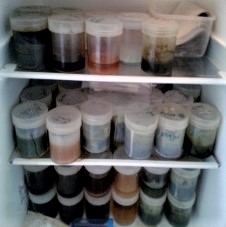EFFICACY OF SELECTED PLANT EXTRACTS FOR MANAGEMENT OF POTATO BACTERIAL WILT (RALSTONIA SOLANACEARUM YABUUCHI ET AL., 1995) IN RWANDA
By Marie Chantal
BACTERIAL WILT
Irish potato (Solanum tuberosum) is the fourth major crop of the world after rice, wheat and maize and the second source of energy (after cassava) and income generation in Rwanda. Although potato is an important food crop in Rwanda, its actual yield is below the potential yield. Among the main limiting factors are pathogenic diseases. The most serious disease is bacterial wilt caused by Ralstonia solanacearum. This is considered as the most problematic since it has no known chemical control effective against it.

Potato growers use cultural control methods such as crop rotation, use of clean seeds, planting in non-infected soils and growing tolerant cultivars. However, these strategies have individual practical, technological or economic limitations such as long survival period of the pathogen in the soil even in absence of plant hosts, small farm size for crop rotation programme, insufficient tolerant varieties, and lack of clean seeds. Therefore, biological controls by plant extracts with antimicrobial properties and which are locally available, economically affordable and environmentally friendly could be an alternative in the management of potato bacterial wilt.
RESEARCH
 This research focused on evaluating the efficacy of plant extracts from local plant materials (onion, garlic, stinging nettle, wild marigold, tobacco, lemongrass, African basil, lion’s ear, castor bean, and rosemary) on the management of the pathogen in Rwanda. Initial plant screening was achieved to evaluate the inhibitory effect of water, chloroform, and methanol extracts from the ten collected plant materials on R. solanacearum growth. From this test, three promising plant extracts were used for further in vitro and in vivo screening. In in vitro studies, minimal inhibitory concentration (MIC) of plant extracts was determined.
This research focused on evaluating the efficacy of plant extracts from local plant materials (onion, garlic, stinging nettle, wild marigold, tobacco, lemongrass, African basil, lion’s ear, castor bean, and rosemary) on the management of the pathogen in Rwanda. Initial plant screening was achieved to evaluate the inhibitory effect of water, chloroform, and methanol extracts from the ten collected plant materials on R. solanacearum growth. From this test, three promising plant extracts were used for further in vitro and in vivo screening. In in vitro studies, minimal inhibitory concentration (MIC) of plant extracts was determined.

Under greenhouse and open field conditions, efficacy of the extracts in the control of incidence and disease severity, dose and application frequency, as well as their effects on potato growth and tuber quality are being assessed. The active ingredients of bioactive plant extracts and their modes of action on bacterial wilt will also be identified. Results from this research will be applied to manage bacterial wilt of potato and hence improve potato yield and seed quality.





